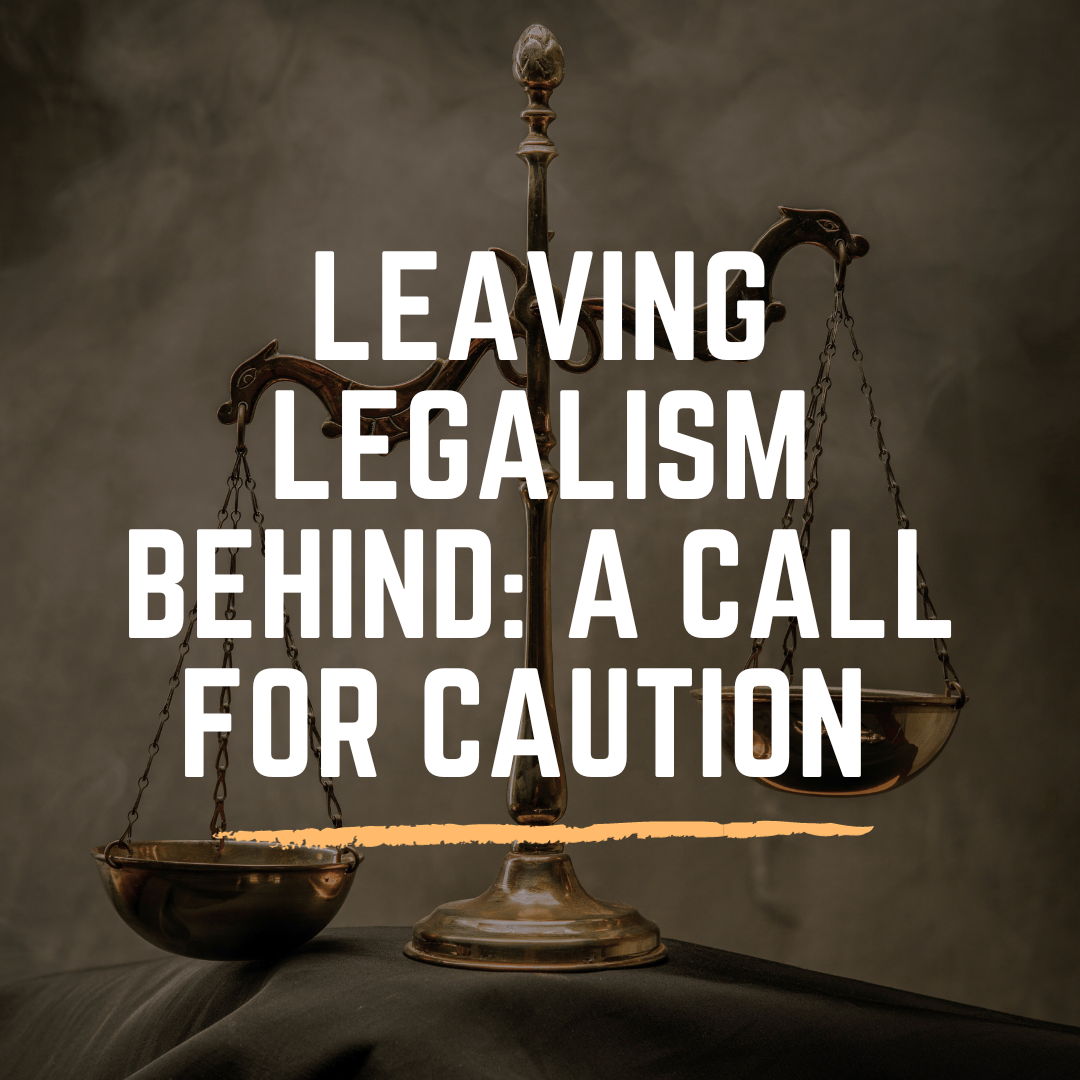Leaving Legalism Behind: A Call for Caution

Last week we sought to define legalism, with an emphasis on the particular form of legalism that I have experienced in my former life as an Independent Fundamentalist Baptist: elevating one’s personal preferences to the level of doctrine, or insisting on them to bind the conscience of another believer.
Opposing this kind of legalism is certainly not seeking to wiggle out of clear commands of Scripture or even principles that can be drawn from the Bible. Rather, it is about not adding non-Scriptural burdens to other sheep that are not explicitly commanded in the Bible and they may not feel compelled to practice.
Yet as strongly as I feel about legalism, there can be some real and present dangers that call for caution in leaving it behind. Fellow Christians have expressed to me the joys of being set free from legalism, and I couldn’t agree more that in the long run that freedom will benefit you and your loved ones. But taking that step can involve potential hazards you may not be aware of and maybe more significantly, an even heavier cross to carry.
What are some of the ditches you can fall into in ending the practice of legalism?
- Inadvertently falling into worse sin: Unfortunately, some Christians loosen their grip on holiness in the process of freeing themselves from oppressive contexts. Galatians 5:13 tells us:
“For you were called to freedom, brothers. Only do not use your freedom as an opportunity for the flesh, but through love serve one another.”
You may come to the conclusion rightly that as a Christian, you are free to go to the movie theater, but you are not free to view porn.
You may come to the conclusion that you are free to have a glass of wine, but you are not free to get drunk.
At one point, I was taught that Deuteronomy 22:5 taught that women could not wear slacks. However, the verse is clearly talking about cross dressing. Still, you may come to the conclusion that you can wear shorts or that women can wear slacks, but we are not free to dress immodestly (1 Timothy 2:9.) Our liberty in matters of conscience do not allow us to drift into sin.
- Sliding into other areas of legalism: If you grow up spiritually in a legalistic context, your natural tendency is going to be to gravitate toward legalism in every spiritual context.
In particular, this posture can show up in theological convictions on issues such as Calvinism v. Arminianism or “young/old earth” that exclude everyone disagreeing with you from being “true Christians.” These conversations are important to our understanding of the world, and maybe philosophy of ministry, but there are people on both sides who know and love Jesus. Understanding theological triage, a topic I have written on, can help avoid this pitfall.
And do not think your newfound denomination or church type is perfect and others outside of it are on Christianity’s “JV squad.” It would be helpful for you to develop friendships with Christians in other types of churches to remind you that you and your church “brand” do not necessarily have a monopoly on truth.
- Leaping from the frying pan into the fire: Having friends from other types of churches doesn’t mean it’s advisable to join them, and walking away from rigid legalism shouldn’t mean embracing a view that any congregation that speaks the name of Jesus is good enough. Friend, it is utterly vital that when you leave legalism, you don’t leave discernment as well, as in almost every New Testament epistle we are told to be on the watch for false teaching and teachers.
Correct doctrine and healthy teaching still matter on the other side of legalism. When churches name the name of Jesus, you must make sure it is the Christ of the Bible who is mighty to save.
- Concluding that all tradition is bad: All groups have traditions in some form – that’s what makes them groups. Christian denominations and churches coalesce around sets of beliefs, principles and practices. Not everything you view as traditional is bad or needs to be thrown away or rewritten. As a matter of fact, such a perspective would be a historically novel and unhealthy way to view the Gospel and Christian truth.
- Not being prepared for opposition: In leaving a church that is deeply entrenched in legalism, you need to be ready to carry your cross. Do not think everyone is going to pat you on the back and tell you how great it is that you have come to this decision. As a matter of fact, you are probably going to have people tell you how disappointed they are in you, adamantly oppose you or even despise you. The reason: such people will feel betrayed and, in particular, vulnerable about their own views. In order to achieve a measure of actual freedom in your Christian life, you must expect to have some people turn on you. Yet carrying the cross and bearing that reproach is a small price to pay for what Christian liberty provides.
If you are questioning whether your current Christian experience qualifies as legalism, I encourage you to go slow, be gracious, and talk to neutral parties you trust before making your decision. In this world of theatrics, you don’t have to announce it on Facebook or Instagram. God will lead those who seek Him in humility and diligence into His truth.
Soli Deo Gloria
More in Blog
April 25, 2024
Part 3: Should Children Have Their Own Service? Developing a Family Culture in Corporate WorshipApril 24, 2024
Part 2: Should Children Have Their Own Worship Service? History and Unintended ConsequencesApril 24, 2024
Part 1: Should Children Have Their Own Worship Service: What Does the Bible Say?